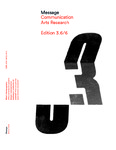Message Graphic Communication Design Research
Issue 3 (2024) What is the topography of the contemporary graphic design / communication landscape in relation to art practice? What occupies the space between disciplines?
In Message journal issue 3 the refereed submissions explore further the boundaries between contemporary graphic design/communication and art, as well as examining what is occupied within the space between the disciplines.
Authors, through written and illustrated submissions, question and investigate the broad nature of graphic design and communication practice and its relationship to art, in relation to both historical and contemporary contexts. The edition debates and illustrates how graphic design/communication can be seen as imaginative, intuitive and creative self (or group) expression – a form of artistic composition – in the same way that we recognise much of art practice. The edition examines practice outside of the conventional boundaries of contemporary graphic design/communication and considers how this space is occupied.
Full Issue
Message Journal, Issue 3: What is the topography of the contemporary graphic design / communication landscape in relation to art practice? What occupies the space between disciplines?
Spencer Roberts, Richard Miles, Andrew Spackman, Craig Barber, Cathy Gale, Zachary Kaiser, and Daniel Jasper

Table of Contents
Graphic Affect
Spencer Roberts, University of Huddersfield.
Indisciplinarity as Social Form: Challenging the Distribution of the Sensible in the Visual Arts
Richard Miles, Leeds College of Art.
The Halsburgs: Alter Egos and Disciplinary Sidesteps
Andrew Spackman, Coventry University and Craig Barber, Norwich University of the Arts.
Critical Design Practice: Mapping a New Territory for the Discipline (or Are We Nearly There Yet?)
Cathy Gale, Kingston University.
Graphic Design as an Artistic Practice for the Unraveling of the Everyday
Zachary Kaiser, Michigan State University.
Elements of Interrogative Style: The Applied Art of Critical Practice
Daniel Jasper, University of Minnesota.

